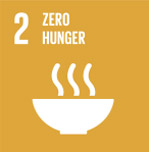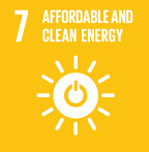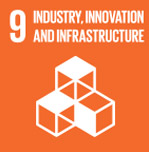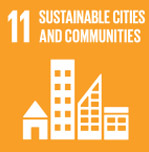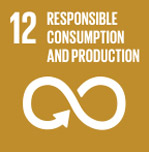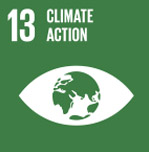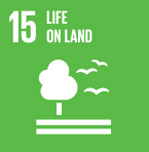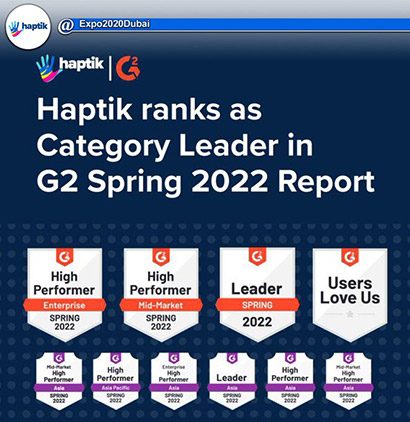Highlights FY 2021-22
1,000 +
Researchers and Scientists
152
Patent applications filed
`2,608Crore
R&D expenditure
Won the CII Innovation
Award
For Reliance's Novel Adsorbent for
Dowtherm & NMP Purification &
RELOX catalyst commercialisation
for PET production
Innovation and
Technology
Reliance believes that innovation
and technology will pave the way
for its steady growth. The spirit of
innovation is central to Reliance's
value system. Innovation, a core
element of the organisation's DNA
enables the Company to create value
for all stakeholders. As a result, the
Company invests significantly in R&D
efforts. The Company always looks for
market opportunities and leverage its
intellectual capital to tap the same.
Be it inspiring the first generation of
retail investors in India, setting up the
world’s largest grassroots refinery,
Reliance’s disruptive innovations
fulfil the aspirations of millions of
Indians. Its continuous innovation
efforts include advancement in
biological science to tackle climate
change, deriving value out of waste to
promote circular economy, affordable
and clean energy initiatives, among
many others. As a consequence of
the Company's relentless efforts, it
has witnessed several breakthroughs
over the years. In FY 2021-22 a total of
123 patents were granted to Reliance
and 152 new patent applications filed
in various jurisdictions. Reliance has
been granted 1,323 patents till date.
Reliance has a robust internal
Intellectual Property (IP) governance
framework that ensures that these
patents are in close alignment with
the organisation’s business objectives.
The IP governance framework helps in
meeting all compliance requirements
in areas such as confidential
information management, third
party engagement management,
regulatory requirements across the
globe, among others.
Reliance has implemented various
digital initiatives to support its R&D
efforts. The R&D team has adopted
a benchmarked Intellectual Property
management system that provides
enterprise-wide end-to-end
workflow management, streamlining
and automating various portfolio management processes. This system
also acts as a centralised repository
of various intellectual properties. The
Company's R&D has implemented
best-in-class Electronic Lab Notebook
(ELN) which is seamlessly integrated
with the Laboratory Information
Management System (LIMS). The ELN
application provides scientists with
a robust platform to capture and
store structured and unstructured
data as they conduct experiments
or execute laboratory procedures.
ELN user interface is flexible and can
be tailored by creating experiment
templates that allow the scientist to
easily enter information and directly
capture results from analytical
instruments and barcode systems for
sample lifecycle management.
Leveraging its Intellectual
Capital to Fight COVID-19
The outbreak of COVID-19 disrupted
every economy worldwide and tested
human vulnerabilities. Nevertheless,
governments and businesses left
no stone unturned to minimise the
impact of COVID-19 on health and
the economy. Reliance, a responsible
organisation, leveraged its intellectual
capital to contribute to the country's
fight against COVID-19.
Reliance’s scientists analysed more
than 1,000 genomes of the virus. The
knowledge base was used to develop
novel cost-effective diagnostic
kits called ‘R-Green’ and ‘R-Green
pro one’. These kits have received
ICMR approval and showed a high
degree of accuracy and specificity
during validation studies. Reliance
has also collaborated with IIIM-CSIR
(Jammu) to develop an RT-LAMP
Kit to facilitate the point-of-care
diagnosis of COVID-19.
The R&D team actively contributes
to the Company's technical wisdom
to facilitate innovation globally
by publishing research articles
on diagnostics and treatment.
Application of natural-astaxanthin for COVID-19 management published in
‘Biomedicine and Pharmacotherapy’
journal is recognised as top 100
research paper. The paper is listed
in WHO’s global repository. The
flow-virometry-based method
proposed by Reliance for robotics-
based high-throughput sample
testing has received accolades from
international communities, such as
the Future Virology journal.
PSA based oxygen concentrators
can produce oxygen with 93% (+- 3%)
purity. The unit is an excellent solution
during hospitalisation situation due
to COVID-19 to maintain the SpO2
level of a patient. Reliance R&D has
designed oxygen generator with a
purity of 90% to 95% with 5 LPM oxygen
leveraging its expertise in adsorption
technology. As adsorbents contribute
significantly to the cost of the PSA unit,
the Company’s R&D team is working
extensively for in-house adsorbent
development for oxygen PSA systems.
R&D Focus Areas
Bio-innovations
Reliance recognises that
advancements in biological science
could transform economies and
societies to tackle climate change
issue. At Reliance, the core biology
stream was integrated with digital
sciences and engineering for development of Next-Gen tools and
eco-friendly technologies for a safe
and healthy planet.
Reliance's synthetic biology platform
aims for innovation-led growth
via hybridising competencies
developed in genetic engineering,
photosynthesis, omics, big-data
analytics and robotics. The platform
has helped improve productivity
outcomes for novel products and
create new business opportunities
in food, personal care and next-
generation biomaterials. Reliance
demonstrated robust and scalable
year-round outdoor algal cultivation
continuously for more than four years.
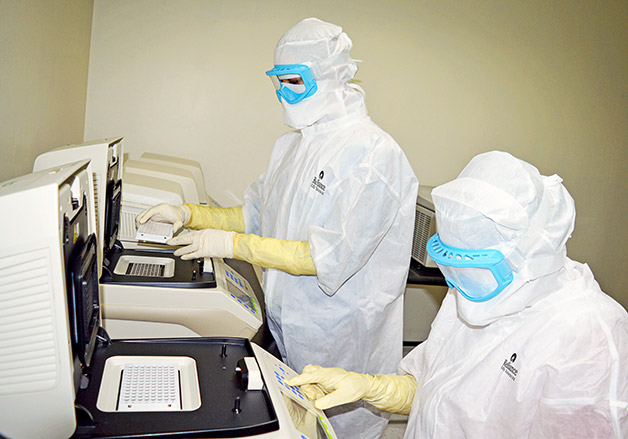
Reliance has successfully
demonstrated the application of
algae biomass for food and feed
application in a sustainable and
eco-friendly way. It has also initiated
work to commercialise super protein
powder from algae for various Indian
and global snacks, health drinks, and
texturised meat substitutes. Algal
biomass produced in a sustainable
way using seawater, sunlight, and
CO2 was harvested and processed
to develop a rich and appropriate
source of highly nutritious food and
feed ingredients. The ingredients
have successfully replaced the
prevalent and environmentally
regressive fish meal ingredient from
various applications.
Reliance has also developed
Microbial cell factories for
fermentation production of one of
the strongest biomaterials such
as Spider Silk for advanced fabric
and personal care application.
Collaboration with some of the
leading personal care brands is
ongoing for developing unique skin
and hair care formulations using this
recombinant spider silk.
The Company also leverages
advanced analytical science to fast-
track innovation in biology. 'Digital
tongue' is an algorithm for prediction
of taste of the proteins and proving
enzyme-system to bias taste of food
towards customer's requirement.
Several ML (Machine Language)
tools were developed and used in
computational biology platforms to
fabricate DNA to make novel products
from microbial cell factories.
The CRISPR platform demonstrated
genome alteration of algae
and cyanobacteria using
programmable nucleases. The
R&D team is working relentlessly
for developing molecular tools and
applications of the technology for
agricultural and synthetic biology
product development.
The team is applying this technology
for higher algal biomass and novel
product development in crops
that conventional methods cannot
produce. The Company aims to use
this path breaking technology to solve
significant challenges.
Coal which cannot be mined and, if
not redeemed for its value in the form
of methane production, would be a
waste of natural resources. Reliance's
Bio CBM process is targeted at
converting coal that cannot be mined
to methane, which will help improve
the country's energy security and
even help reduce GHG emissions.
Circular Economy
The single use plastic in food
packaging and consumer goods
mostly ends up in landfills. Reliance
recognises the negative impact of
single use plastic on the environment.
Reliance is exploring sustainable
solutions to reuse plastic waste
to promote and adopt a circular
economy to tackle this menace.
The Company's R&D team and the
Sustainability Solutions team in the
Reliance-Petchem business have
launched ReRouteTM, the only product
of its kind in the market today that
can be used to make bituminous
concrete road surfacing using the
'dry mix' process.
The R&D team also developed net
bags and bag on roll applications
using biodegradable plastic. These
have been tested at Reliance Retail
stores. The materials showed excellent
properties required for flexible as
well as rigid packaging. Innovations
in biodegradable plastic technology
have also moved from bench scale to
pilot scale development.
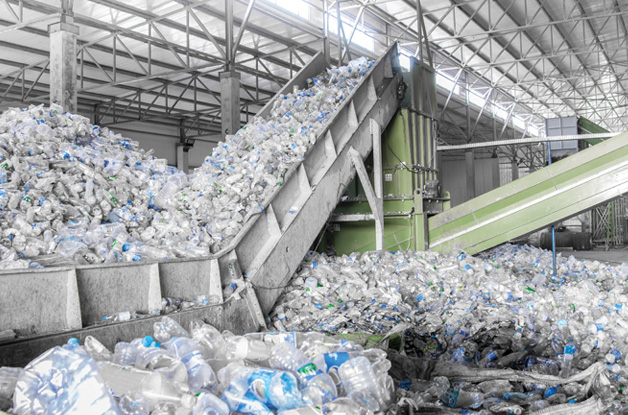
Reliance's low temperature
continuous catalytic pyrolysis
technology can convert plastic waste
containing multi-layer film polymers
into stable oil. The technology does
not require any feed segregation
or clean up. Additionally, this novel
process gives a higher yield and
enhanced stability. The produced
stable oil can be readily processed in
a refinery or petrochemical units such
as FCC, Coker, Steam cracker, etc.
Reliance uses RCAT HTL technology to
produce biofuel using various organic
feedstock wastes to derive value
from the waste. Produced biofuel
can be utilised for heat and power
applications or as a transportation
fuel. Biofuel generated using the
technology has been successfully
tested in commercial engines,
and the technology is ready for
commercialisation. The technology
has the potential to significantly
contribute to the Company's Net Zero
goal by achieving a 25% blend in its
refining capacity.
Discarded PET based fabrics
have a detrimental impact on
the environment. As an essential
step towards a circular economy
and addressing the challenge of
discarded PET based fabrics, the
Company's R&D is targeting to
separate PET from mixed fabric
blends and convert it back to fibers
and into fabric. The R&D team has
also developed a process to recycle
waste tyres and is exploring ways to
convert waste recyclable polyester
material into valuable chemicals to
make polyurethane with improved
physical properties. The team
developed a bench process using
a Reliance proprietary solvent to
separate different layers of polymer.
Separate layers can be recycled as
per their different functionalities and
processability.
Earlier, a benign process was used
to recover high-value metals,
vanadium and nickel, from petcoke
cinder, which is a leftover by the
product from entrained flow
gasifiers. Hydro process demands
a large quantity of acid or alkali for
leaching, and pyro process involves
very high temperature (> 1,700OC).
The R&D team has developed a
hybrid process where salt roasting
at low temperature, followed by
hydrometallurgical processing steps,
leads to the extraction of vanadium
and nickel at a significantly lower cost
than the conventional process. R&D
team is also pursuing various national
and international collaborative
projects to utilise CO2.

Chemical Recycling
of Multilayer
Packaging Material
Approach: The Polymer R&D team
developed a novel process using
in-house developed chemical
‘RESOLVE’ for separation of polymer
layers in multilayer packaging.
The process is a simple two-step
approach using ‘RELSOLVE’ separating
medium and it avoids the complex
multistep process involving various
solvents and antisolvents for the
recovery of the polymer layers.
Impact: The process helps in
recovering the polymer layer in pure
form without dissolution.
Industry and infrastructure
Reliance has its pulse on evolving
consumer needs, and it leverages
its intellectual capital to develop
novel solutions for industry and
infrastructure use. Following are
the key initiatives undertaken
by the R&D team:
- R&D team has developed a novel
functional emulsion based SBR
rubber. Reactive silica composite
prepared from this reactive product
has low rolling resistance and
excellent abrasion properties.
- Poly Vinyl Chloride (PVC) is generally
processed with a higher quantity of
external plasticisers to make it more
flexible and processable. However,
this flexible PVC polymer has poor
leaching properties. Reliance has
developed internally plasticised-
PVC (IP-PVC), which does not need
external plasticisers. Additionally,
IP-PVC does not lose its inherent
properties of flexibility and neither
does it leach any plasticiser into
the environment.
- R&D team has developed quick and
visible methods for identification
of industrial popcorn samples
from normal elastomer/polymer
samples, thereby, enhancing the
safety quotient of the elastomers or
polymer processes.
- R&D team has developed a
novel polymer, disentangled high
molecular weight polyethylene
(DPE), for lightweight helmets, cut-
resistant gloves.
- The chlorination of PVC produces
chlorinated Polyvinyl Chloride
(CPVC). UV-light meditated
photochlorination of PVC to CPVC
is a common industrial practice
to produce CPVC resin. Reliance
has developed in-house visible
light mediated photochlorination
by replacing hazardous UV light.
The CPVC has improved resin
properties than the commercially
available option.
- R&D team has developed
an innovative, green, and
commercially viable process
to produce selective infrared
transmitting polymeric materials.
The NIR-transmitting material is
produced through solid-state
reactive processing and is cheaper,
non-toxic, air and moisture stable
with the added advantage
of the flexibility to mould into
the desired shape.
- R&D team is developing
technologies to make low-
cost carbon fibers using
various raw materials.
- There is a growing demand for
novel solutions that provide
protection to process and structural
components from corrosive
environment. R&D team has
developed thermoset composite
solutions that can be coated on
surfaces to provide adequate
protection from mild to the harsh
corrosive environments.
Affordable and Clean Energy
Reliance believes that climate
change presents an opportunity
to create a healthier, happier, and
sustainable planet. Affordable and
clean energy options will realise this
opportunity for humanity. The R&D
team has been operating a large
pilot facility near Jamnagar, where it
converts sunlight, CO2 and seawater
to renewable bio-crude. The ponds
have been operating continuously
without any failure for more than
four years. No other organisation in
the world has been able to cultivate
algae without crashes and significant
downtime. Reliance has developed
all the technology components which
will be instrumental in converting
CO2 to useful products to combat
climate change.
The Company has
also developed a
catalytic gasification
technology that can
convert a variety
of carbonaceous
feedstocks like
petcoke, coal,
biomass, etc. into
hydrogen and
syngas.
The novel catalytic process can
be used to convert challenging
feedstocks like high-ash Indian
coal and agricultural residue into
hydrogen or syngas. The Company
has successfully completed plant
testing of the technology with
different agricultural residues and
high-ash Indian coal, and 10 TPD plant
capacity is being worked out.
A high temperature-polymer
electrolyte membrane (HT-PEM) fuel
cell system has been built and is
presently being tested on simulated
Reliance-Jio towers. In coming years
renewable hydrogen will supply fuel
cells to produce in-situ hydrogen.
Oil to Chemicals (O2C)
Fossil fuels like gasoline and diesel
have a high carbon footprint
impacting the environment.
Having committed to a Net Zero
target by 2035, Reliance strives to
explore innovative options to adopt
sustainable practices. Reliance's
Multizone Catalytic Cracking (MCC)
is an in-house disruptive innovation
to generate chemical building blocks
for speciality materials from refinery
streams or whole crude instead of
fuels. The MCC is a vital technology
enabler that will help in Jamnagar's
O2C transformation. The 3KBPSD MCC
demo plant is in the advanced design
stage and has been constructed
for a demonstration before building
a full-scale commercial plant.
A unique technology has also been
developed to separate the aromatics
BTX component from olefinic MCC
gasoline and recycle the raffinate
stream to MCC riser for maximising
petrochemicals production.
Refining and Petrochemicals
Reliance has developed a high-
capacity sodium removal adsorbent
and a process to remove trace
amounts of sodium from disulphide
oil (DSO). This solution has been
commercialised at Jamnagar.
The treated DSO is being utilised in
Reliance's Refinery Off-Gas Cracker
(ROGC) unit replacing imported costly
additive, Dimethyl disulphide (DMDS).
A facility is also being developed at
the JMD to transport the product to
Reliance's other petrochemical sites
to use them in-stream crackers.
The R&D team has developed an
in-house RELOX (Reliance Oxidation)
catalyst for the purification of
nitrogen gas streams. The RELOX
catalyst purifies nitrogen gas
streams containing hydrocarbon
impurities and is used in the nitrogen
purification unit. The RELOX catalyst
is being supplied to the PET HMD
site, where production is in progress.
The Company aims to use RELOX catalyst in all PET plants for nitrogen
gas purification.
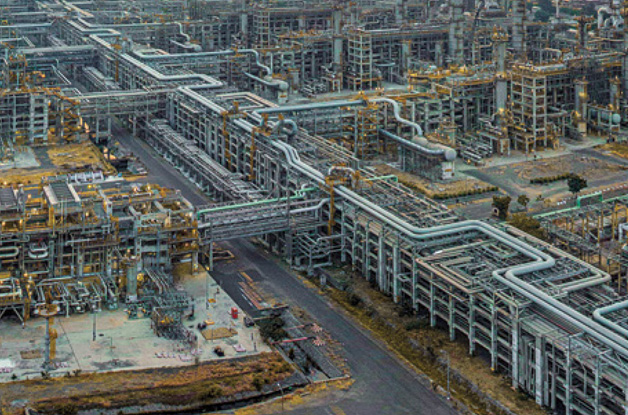
Thermic fluids are predominantly
used in high temperature process
applications between 150O C and
400O C. For the first time globally, the
R&D team has developed an in-house
novel adsorbent and a process for
the online purification of thermic
fluids. The technology has been
commissioned at Dahej and Silvassa
plants and is under commissioning
in Hazira. Besides being superior
to conventional techniques like
distillation and alkali wash, this
technology is environmentally friendly
and cost effective.
The R&D team has developed
REL-ORCAT, a proprietary catalytic
technology, for olefins removal or
BI reduction from aromatics rich
hydrocarbon streams. The technology
with its superior catalyst has the
potential to replace conventionally
used clay-based catalyst. The team
has also developed an eco-friendly,
single-step adsorptive process to
purify recycling/waste MEG generated
in polyester plants. Further, to
maximise propylene yield, conversion
and reduce the coke make, the team
has developed a process for High
Active FCC catalyst.
Biodegradation is the most
sustainable and economical way
of industrial effluent treatment, as
it leads to terminal conversion of
organic pollutants into microbial
biomass without leaving behind
toxic residues. Once established, it’s
a self-regenerating system. Tailor
made microbial consortia have been
developed, scaled, and implemented
for consistent chemical oxygen
demand (COD) remediation at the
polyester ETP plant at Patalganga
Manufacturing Division (PMD).
Similarly, a specialised microbial
consortium has been implemented
for COD reduction at Silvassa
Manufacturing Division (SMD) for
smooth and uninterrupted operations.
Climate action
R&D team has developed a mixed
oxide stable catalyst to convert
methanol and CO2 to a high-value
Di-methyl carbonate (DMC) product
that can be used as a solvent and
specialty chemical. The process
and the catalyst have been scaled
up to a pilot stage. The team has
also developed a sorbent based
circulating fluidised bed process
for concentrating CO2 from dilute
refinery and power plant flue
gases. The process is protected by
several patents.
Under RIL's flagship programme,
Algae to Oil, the R&D team has
developed a technology that utilises
abundant sunlight, waste CO2 and
sea water, to produce valuable
products. This process has a huge
potential to utilise atmospheric CO2
and convert it to a valuable green
crude oil, thus reducing the carbon
footprint to a significant extent and
combating climate change. RIL has
been operating a large pilot facility at
Gagwa near Jamnagar.
Leveraging its technology investment
and customer engagement, Jio
has indigenously developed and
launched a full stack of digital
products, platforms and services
for multiple ecosystems serving
consumers and businesses. The Jio
R&D team, with over 9,000 technical
and research professionals, has
developed leading technology
platforms spanning 5G stack, cloud
and edge compute, devices &
operating systems, blockchain, IoT,
mixed reality, AI / ML, secure identity
and natural language processing,
among others. Till date, Jio has been
granted 417 patents across multiple urisdictions for the pioneering
initiatives it has undertaken. In
FY 2021-22 alone, the company filed
for 110 patents and was granted
46. Among the key technology
areas covered by these patents
are vDLT (Virtual Distributed Ledger
Technology), 5G User Equipment, AI for
Health and Agriculture, IoT, Industrial
4.0 and AR/ VR.
Data Privacy and Security
Considering the wide range of digital
services Jio offers, it is important
for the company to provide a safe
and secure experience while using
its services. Jio always strives to
assure users that their personal information is protected. To this end,
data privacy, data protection, and
information security form an intrinsic
part of Jio's service design across the
entire lifecycle.
Jio’s privacy and security programme
focuses on three key aspects of
embedding security in design,
effective governance and enabling
organisation-wide security
awareness. Jio tries to minimise the
chances of security incidents by
defining and implementing a highly
effective governance structure. It has
implemented a holistic information
security management programme
to protect its business, customers,
infrastructure, services, and internal
users from security threats. The
Company has policies (including
Data Privacy Policy), standards, and
processes in place.
Jio also conducts security risk
assessments to evaluate and identify
security flaws in services, products,
and technology. It has implemented
state-of-the-art security monitoring
infrastructure and effective incident
detection and management
processes. Suspected events are
analysed and verified for its impact
on assets and organisation. The
incident movement processes
define the criticality level for every
incident and are managed in line with
documented processes.

R-phish: A phishing
simulation platform
to measure user
awareness level
Phishing is a form of Cyber-attack
where Cybercriminals attempt to
trick individuals by disguising as
a trustworthy source. Although
organisations have tried numerous
ways to prevent phishing attacks,
there is no full-proof solution.
Therefore, employees become the
last line of defence.
Several organisations use Simulation
based anti-phishing exercises as
a method to educate employees.
However, it only assesses an
employee’s susceptibility to phishing
attacks which varies with every
new simulation.
To address this, Reliance has
developed a phishing simulation
platform ‘R-phish’ to conduct anti-
phishing exercises on a periodic basis
and to calculate the user awareness
index ‘Phishing Resistance Score
(PRS)’. PRS, which is a function of
multiple factors attributing to user
awareness initiatives, determines
user’s resistance to identifying a
phishing email.
Way Forward
Reliance believes that innovation and
technology will be key to its continuous
growth. Over the years, Reliance has leveraged
digital technologies and tapped business
opportunities through innovative business
models. Customer-centricity, care, and
commitment to building a better world and
India have always been at the core of its
innovation and R&D efforts. The Company has
always focused on developing new products
at affordable prices and expanding product
applications to broaden the access and
reach of its offerings. Having committed to a
Net Zero target by 2035, Reliance focuses on
developing innovative products and solutions
that contribute towards building a sustainable
world.
Reliance will focus its R&D efforts to develop
technologies that promote circularity and
help it fulfil its ambition to build an entire
green energy ecosystem. The Company will
continue to focus on industry innovation to
explore alternative and sustainable options for
industrial and infrastructural needs.
